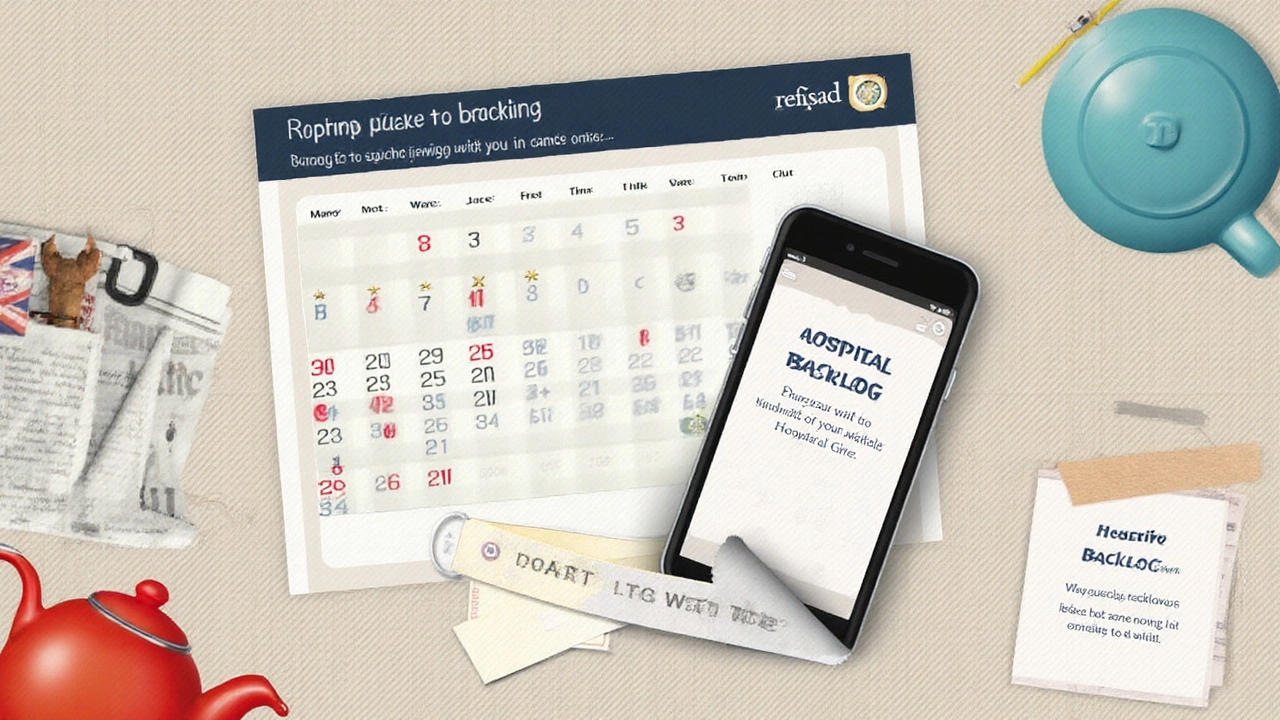 Aug, 7 2025
Aug, 7 2025
Bottle up some patience before you call your GP. Yes, the NHS has a waiting list. Not just one—thousands. People up and down Britain have felt it: making a doctor’s appointment and waiting weeks, even months, for that hospital letter. Waiting times for routine operations, diagnostic scans, specialist appointments—these lists quietly dictate daily life for millions. Sounds a bit outdated? The truth is, the NHS waiting list is the largest it’s ever been in 2025, and it’s affecting everything from knee replacements to cancer care.
What Causes NHS Waiting Lists?
Try to picture the NHS as the world’s longest queue. It isn’t about apathy—demand is just off the charts. Angina, hip pain, catching a suspicious lump—there’s always someone ahead in line because there’s only so much capacity. For years, demand has outpaced staff and resources, with COVID-19 acting as rocket fuel thrown onto an already smouldering backlog. Elective surgeries were paused. Clinics shut their doors to anything but emergencies, and suddenly hundreds of thousands more joined the queue.
Now, as of summer 2025, the waiting list is hovering around 7.6 million—the highest number ever recorded in England. That’s not just hype; the government’s own figures highlight it month after month. To put it simply, about one in every eight people in England is somewhere on that list, whether it’s for cataract surgery, a mental health assessment, or cancer treatment. Shockingly, almost half a million have waited more than a year—far longer than the official 18-week target set out by the NHS Constitution.
What’s driving the numbers? It’s a cocktail of staff shortages, hospital closures, burnout, and budget squeezes. Recruitment can’t keep up: there are more than 110,000 staff vacancies across hospitals and surgeries. Then, toss in a population that’s older and sicker than ever. It’s no wonder GPs, surgeons, and nurses are stretched to their limits every single shift. On top of that, new drugs and advanced diagnostics—while great—also put extra strain on specialist services. People are living longer, but often with more medical needs at once.
The government does try to shorten the list—sending in rapid response surgical teams, dishing out extra cash, and making use of private hospitals. But with every minor victory, the finish line nudges further ahead. The hope is always for a quick fix, but solving a decades-old problem with more people and more funding doesn’t always work as planned when the demand just keeps growing.
Let’s be real: NHS staff want faster care for everyone. But while the bureaucracy wrangles with policy, it’s patients who clock up the hours watching their phones for a call, rubbing calendars, and feeling frustration set in. If you’re caught in limbo, you’re not alone.
| Year | Total People Waiting (England) | Median Wait (Weeks) | People Waiting 52+ Weeks |
|---|---|---|---|
| 2015 | 3.2 million | 6.2 | 1,500 |
| 2020 | 4.4 million | 8.8 | 22,500 |
| 2022 | 6.1 million | 11.4 | 340,000 |
| 2025 | 7.6 million | 14.7 | 484,000 |
Waiting times don’t hit people equally. In deprived areas, waits tend to be longer. Certain specialties—like orthopaedics and mental health—are especially bogged down. Geography makes a difference too: studies found northern regions and parts of Wales have consistently longer waits than most of London or the southeast.
Is help on the horizon? The NHS is rolling out digital triaging, new one-stop clinics, and beefing up community services. But physical infrastructure takes years to build. Some suggested using empty retail spaces as temporary clinics or investing more in telemedicine so simple cases don’t even need face-to-face appointments. It’s a work in progress.

How Waiting Lists Change Healthcare Choices
Waiting for treatment changes your behaviour. It’s not just about how long you twiddle your thumbs—it can actually shape your choices in big ways. Brits now look to private options more than ever before. A survey by the British Medical Association in July 2025 showed that 18% of people have paid out of pocket for faster care in the last two years. That’s a record, and it’s causing a quiet shift. Suddenly, companies are selling health insurance and private packages faster than they can print new pamphlets.
Why fork out? Most folks turn to private hospitals because the NHS waiting list just feels endless for their condition—often orthopaedic surgeries, dermatology, or quick scans. There’s also a convenience factor: private clinics often give you a date there and then, while the NHS might leave you waiting for a letter for months.
It goes further. Some families delay retirement or make big financial sacrifices, dipping into savings or even crowdfunding for urgent care. Anecdotally, more people travel for treatment—either within the UK or, if they can afford it, to specialists abroad. "Medical tourism" isn’t just for cosmetic tweaks; it’s for cancer, cardiac care, fertility treatment. The NHS in 2025 has been forced to offer treatment vouchers for patients with prolonged waits—an experiment to let people go private at public expense, but the rollout is patchy and waiting times still climb.
Mental health waiting lists deserve special mention. Young people frequently wait over six months just for an initial assessment. For eating disorders, reports show waits of up to a year in some regions. It’s contributed to a surge in private online therapy sessions, with platforms like Ieso and Kooth reporting record sign-ups this year. The gap between NHS promise and real-life experience is widest when it comes to non-urgent but still serious health problems.
Chronic pain sufferers are a forgotten crowd. Stuck on waiting lists for injections or joint replacements, their everyday life can grind to a halt. Some end up relying on strong painkillers for far longer than they’d like. There’s a risk their condition worsens—meaning more treatment, more cost, and potentially more permanent disability.
But here’s a twist: waiting isn’t always a negative. Sometimes, symptoms resolve, or priorities change during that time. Occasionally, people find a workaround with physiotherapy or lifestyle changes and never need the operation at all. Still, for cases like cancer, rapid turnaround is life or death. The stats don’t lie—survival rates drop sharply the longer people wait for some diagnoses. It’s a hit-and-miss experience. That’s why it pays to know your options and how to work the system.

Tips For Navigating The NHS Waiting List
So, if you’re parked on a waiting list, what can you actually do? First, keep in close touch with your GP. If your symptoms worsen, or you feel things are dragging, let your doctor know. They can sometimes fast-track you if there’s a significant change in your condition, so don’t be shy about giving them updates—be politely persistent.
Next, ask for your unique patient reference number (URN) for your referral or surgery, and keep it handy. This makes it much easier to check your status with hospital booking teams. Some NHS trusts now offer online "patient portals"—log in to see updated wait times, appointment slots, and even cancel or rebook if something comes up. If you’re not online, don't worry; old-fashioned phone calls still work. Just be prepared for hold music.
If you’re flexible with time or location, let your doctor know. Sometimes you can be treated quicker at a different hospital or clinic, especially if you’re willing to travel. Plus, certain hospitals take part in “choose and book” schemes, which can slash months off your wait if you’re open to going further afield.
Keep all your documents, appointment letters, test results, and GP’s notes organized. If you ever need to chase up something, it’ll save a ton of hassle. Some patients find it helpful to keep a health journal—note down symptoms, any new problems, and what works or makes things worse. It means you’re ready for your next appointment with clear info.
- Call the hospital’s Patient Advice and Liaison Service (PALS) if you feel your wait is unreasonable—they can sometimes nudge things along or chase up lost paperwork.
- In urgent cases or if your condition seriously worsens, go to A&E as a last resort—doctors can refer you for emergency assessment or bump you up the priority list if needed.
- Stay proactive: maintain your health while you wait. Exercise safely, follow your care plan, and ask if there are any interim support groups or physiotherapy options near you.
- Double-check if your region offers NHS “patient choice” or out-of-area treatment. Some commissioning groups allow this if local waits are above official targets.
- If your GP suggests a private option but you can’t afford it, ask about NHS funding for out-of-area or independent sector providers in special cases.
Savvy patients look for NHS “cancellation lists”—these work like flight standby. If someone cancels last minute, you might get their slot, but you need to be able to go on short notice. Not all hospitals offer this, but it’s worth a call to bookings.
If finances allow, consider splitting care: see an NHS consultant privately for an initial diagnosis and then transfer care back to the NHS for treatment. It’s not for everyone, but it sometimes saves weeks or months. Remember, though, always ask for all records to be forwarded—and check with both sides that your appointments line up.
Finally, keep a cool head. The system is under strain, and staff want to help. Mistakes can happen—lost referrals, missed scans, admin blunders—so check your details at every step. If you hit a wall, charities like Citizens Advice or Healthwatch offer free advocacy and help with complaints. Sometimes an official letter gets things moving.
The bottom line? The NHS waiting list isn’t just a bureaucratic headache—it’s a daily reality with workarounds, odd little victories, and a lot of goodwill from overworked staff. With some patience, clear communication, and timely nudges, you can make your time in the queue a bit more bearable.
